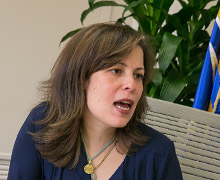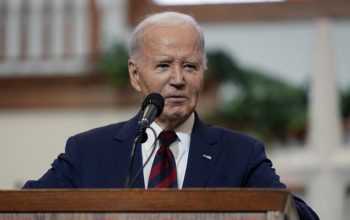news
Head of the OAS Environmental Law, Policy and Good Governance Program explains how Sustainable Development Policy is Modeled on the Behavior of Civil Society
July 16, 2015
On July 16, the GFDD Global Roundtables welcomed Claudia De Windt, Head of the Environmental Law, Policy and Good Governance Program at the Organization of American States (OAS) Sustainable Development Department. The session focused on the work of the OAS with regards to sustainable development, and in particular the importance of public participation and engagement with all relevant stakeholders to ensure effective public policy making.
GFDD Executive
Director, Natasha Despotovic, opened the session by providing a brief biography about De Windt and inviting her to give the audience an overview of the work of the OAS to promote sustainable development in the Americas.
De Windt explained that the concept of sustainable development
had guided the work of the OAS since the early 90s, seeking to incorporate the concept with its objective of poverty eradication. Stressing that “public policy is the lynchpin of sustainable development” De Windt emphasized that achieving a correct balance between the three pillars of sustainable development (economic, social, and environmental) could only be reached with the participation of all stakeholders, including those dependent on and living with natural
resources as “sustainable development policy is modeled on the behavior of civil society.” Referring to best practices in the Dominican Republic, she confirmed that the OAS had worked on implementing the organization’s “Inter-American strategy for the Promotion of Public Participation in Decisions regarding Sustainable Development” through a practical manual that identified available mechanisms within the country and provided guidance on how
they could best be implemented.
Questioned by Despotovic about the concept of environmental governance, De Windt defined it as “a process that facilitates the area of sustainable development.” She explained that it included questions that relate to “participation, accountability, financing, access to information, and the use of that information in decision making.” She explained that the concept was finally taking hold as society
had realized that “in order to achieve conservation and sustainable use of natural resources, we need effective public management and good governance” and solid institutions. She noted that this realization was being enshrined in constitutions across the world, including that of the Dominican Republic.
Concluding with her thoughts on
the United Nations (UN) Post-2015 Development Agenda, the UN’s new international development framework due for adoption in September 2015, De Windt confirmed that in its capacity as a regional agency of the UN, the OAS would be the first region with a strategy for the implementation of these objectives within each member country.
About Ms. Claudia De Windt
Claudia De Windt previously practiced law with Headrick, Rizik, Alvarez
& Fernandez in the Dominican Republic, and later became a member of the roster of environmental law experts on the Treaty of Economic Alliance between the European Union and Central America, and a member of the World Commission on Environmental Law of the International Union for the Conservation of Nature. Ms. De Windt now serves as the head of environmental law, policy and governance of the Department of Sustainable Development of the OAS. She is today the head of Environmental
Law, Policy and Good Governance at the OAS Department of Sustainable Development.
About the Global Roundtable
In close association with the United Nations, the Mission of the Dominican Republic to the UN, GFDD organizes regular meetings with UN Ambassadors and other prominent figures in the international community in an effort to spread the news, knowledge, and understanding of other countries, global issues, and work of different United
Nations bodies to its audience in the Dominican Republic, the U.S., and around the world.
The regular series, GFDD Global Roundtables are also a part of GFDD’s program to support the work of the United Nations and, as a non-governmental institution affiliated with it, contribute to the visibility and understanding of its work.
Related Links:
www.gfddglobalroundtable.org







